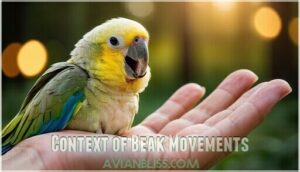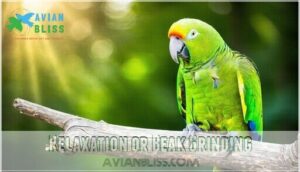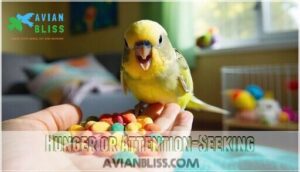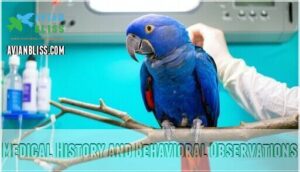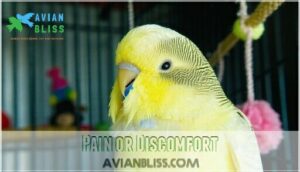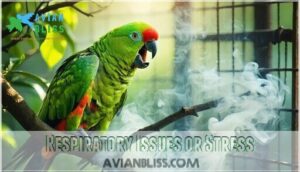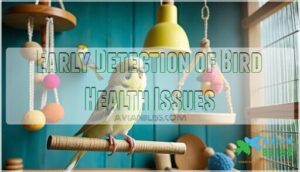This site is supported by our readers. We may earn a commission, at no cost to you, if you purchase through links.
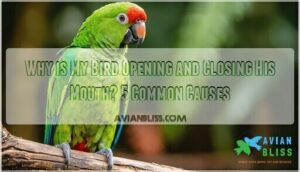
Birds often mimic juvenile begging behaviors to get your attention, especially around feeding times. This rapid beak movement can also indicate crop adjustment after eating, which should resolve within hours.
However, persistent mouth opening with neck stretching or repeated swallowing may signal crop issues or respiratory problems requiring immediate veterinary attention.
Watch for context clues: relaxed birds grinding their beaks show contentment, while distressed birds display different body language. Understanding these subtle differences between normal communication and potential health concerns can save you unnecessary worry and help you recognize when professional intervention becomes critical.
Table Of Contents
- Key Takeaways
- Bird Behavior: Rapid Beak Movements
- Context of Beak Movements
- Potential Explanations for Beak Movements
- Medical History and Behavioral Observations
- Concerning Reasons for Beak Movements
- Early Detection of Bird Health Issues
- Frequently Asked Questions (FAQs)
- Why is my bird opening and closing its mouth?
- What does it mean when a baby bird’s mouth opens and closes?
- What does it mean when a bird opens its beak wide?
- Why does my parakeet open its beak?
- Why do pigeons open and close their mouths?
- Is it normal for birds to open and close their mouths?
- Why is my bird opening and closing its beak?
- Why is my bird’s mouth constantly open?
- Why is my baby bird opening and closing its mouth?
- Why is my budgie opening and closing its mouth fast?
- Conclusion
Key Takeaways
- Watch your bird’s mouth movements for clues—hunger, attention-seeking, or crop adjustment are usually harmless.
- Persistent open-mouth behavior or neck stretching could signal respiratory or crop problems, so don’t wait to call your vet.
- Beak grinding and relaxed gestures mean your bird’s comfortable, while frantic or repeated movements may point to discomfort or illness.
- Track changes in frequency and intensity of beak movements, especially after illness, to catch health issues early.
Bird Behavior: Rapid Beak Movements
When you notice your bird opening and closing his mouth rapidly, he’s likely trying to communicate with you or signal that he’s hungry.
This behavior is especially common when you’re nearby and can indicate your feathered friend is simply saying "hello" or asking for his next meal, which can be seen as a way of communicate or signal hungry.
Communication or Hunger
Opening and closing its mouth rapidly often signals social cues from your bird.
This bird communication involves beak movements that differ from eating or preening – it’s focused attention-seeking behavior.
Begging behavior mirrors juvenile mimicry when chicks demand food.
Your feathered friend’s open-mouth calling might mean "Hey, notice me!" or "Time to eat!"
Bird behavior like this represents natural territorial displays and communication attempts.
Understanding your bird’s body language signs is essential for effective communication and building a strong bond.
Potential Regurgitation
If your bird’s opening and closing its mouth looks like rapid beak movements, it might be showing Regurgitation Signs. This is a common Feeding Behavior, especially when your bird feels relaxed or social.
Keep an eye on Crop Function—if the crop stays full or your bird seems uncomfortable, it could signal Digestive Health or bird health issues.
You may also want to think about nutritional bird supplements to support their overall health. Don’t hesitate to call your vet if you spot anything unusual.
Monitoring Crop Health
Regurgitation isn’t the only concern when your bird keeps opening and closing its mouth. Watch for crop fullness after meals – this small pouch should empty within hours of feeding.
- Monitor your bird’s emptying rate to spot digestive system problems early
- Look for discomfort signs like neck stretching or repeated swallowing motions
- Schedule veterinarian consultation if the crop stays full beyond normal timeframes
Healthy crop adjustment happens naturally, but persistent beak movements might signal trouble brewing.
Context of Beak Movements
You’ll notice your bird’s mouth movements happen most often when you’re nearby, especially after gently adjusting their crop area.
This timing isn’t coincidental – your bird is likely responding to your presence and the physical interaction you just had with them.
Proximity to Bird
Your physical closeness matters when your bird starts opening and closing its mouth.
Watch for this avian behavior during Owner Interaction moments—when you’re near the cage or handling your pet.
This beak movements pattern often signals attention-seeking or communication attempts, building Trust Building opportunities.
Smart Bird Comfort comes from maintaining Safe Distance while observing.
However, don’t ignore potential respiratory infection signs.
Proper Handling Techniques help you distinguish between social signals and health concerns requiring veterinary attention.
After Crop Adjustment
After feeding time, your bird’s opening and closing its mouth might signal crop-related changes happening beneath the surface. This behavior often occurs when your feathered friend is adjusting to recent dietary modifications or processing their latest meal.
Your bird’s crop is like a built-in food processor, working overtime after every meal
Here are three key factors to monitor:
- Crop Emptying Rate – Watch how quickly food moves through your bird’s crop, as slower digestion efficiency can trigger beak movements
- Nutritional Absorption – Poor nutrient uptake may cause discomfort, leading to repetitive mouth gestures
- Regurgitation Prevention – Beak movements can indicate your bird’s natural attempt to prevent unwanted food backup
Crop adjustment involves your bird’s digestive system recalibrating after meals. Think of it like your stomach settling after a big dinner. Monitor your bird’s crop health by gently feeling the area – it should gradually empty between feedings.
If beak movements persist alongside a consistently full crop, consider probiotic supplementation to improve digestion. However, ongoing avian behavior changes warrant veterinary consultation to rule out underlying issues.
Birds’ beaks are examples of specialized bird adaptations.
Potential Explanations for Beak Movements
You’ve narrowed down the timing, but what’s causing your bird’s mouth movements?
Several common explanations range from normal behaviors like beak grinding for relaxation to attention-seeking hunger signals.
Though some movements might indicate underlying discomfort or health issues requiring closer observation.
Relaxation or Beak Grinding
Sometimes your bird’s mouth movements can be completely normal – like when they’re simply relaxing. Beak grinding is a common comfort indicator that shows your bird feels safe and content. This silent grinding behavior resembles how cats purr when happy.
Beak movements during relaxation typically occur when your bird settles down for the evening or after a satisfying meal. The grinding frequency usually stays consistent and gentle, unlike stress-related behaviors that appear erratic or intense.
Environmental impact plays a key role in this avian behavior. A cozy, secure setting encourages natural grinding patterns that support beak health through gentle wear. However, if you notice sudden changes in frequency or your bird seems uncomfortable while grinding, schedule a vet checkup to rule out underlying issues.
Hunger or Attention-Seeking
Birds use begging behavior as a direct line to your heart and your snack stash.
When your parakeet opens and closes its beak repeatedly, it’s mimicking feeding cues from its wild days—essentially saying "Feed me now!"
This social interaction stems from the weaning process, where young birds learned that persistent beak movements equal results.
Your feathered friend has simply figured out this tried-and-true method works on humans too.
You can find a variety of suitable parakeet foods online.
Discomfort and Health Considerations
While hunger might explain some beak movements, health concerns shouldn’t be overlooked. Your bird’s mouth opening could signal something more serious brewing beneath those feathers.
Crop Issues top the list of potential culprits. When your bird’s crop doesn’t empty properly, discomfort follows. Respiratory Problems also manifest through mouth breathing, especially after recent Respiratory Infection. You’ll notice labored breathing alongside the beak movements.
Watch for these red flags in avian health:
- Foreign Objects lodged in the throat causing repeated swallowing attempts
- Vitamin Deficiency leading to oral plaque and swelling
- Oral Trauma from injuries creating persistent discomfort
- Toxin Exposure from household aerosols or nonstick cookware fumes
- Stress-related behaviors mimicking medical symptoms.
Bird health issues don’t always scream for attention. Your feathered friend might be masking pain through instinctive behavior. If beak movements persist beyond normal feeding times, or you notice changes in appetite, energy levels, or droppings, don’t wait. Early veterinary intervention prevents minor discomfort from becoming major problems.
Medical History and Behavioral Observations
Your bird’s medical history provides essential context for understanding current mouth movements.
If your feathered friend recently recovered from a respiratory infection, these behaviors might be lingering effects or signs of incomplete healing.
Recovery From Respiratory Infection
Post-infection recovery requires careful monitoring since respiratory issues can resurface unexpectedly.
Your budgie’s recent Baytril treatment ended two weeks ago, showing positive signs with improved appetite. However, antifungals and antibiotics sometimes mask underlying problems.
Watch for subtle changes in breathing patterns or medication side effects. Environmental adjustments like proper ventilation support avian health during this critical healing phase.
Relapse prevention means staying alert to mouth movements that could signal lingering respiratory problems. Unsanitary conditions can also contribute to these issues, so make certain you maintain clean environments.
Frequency and Intensity Monitoring
After Solar’s recovery from respiratory infection, you’ll want to track his beak movements like a detective gathering clues. Start by establishing his baseline behavior – how often does he normally open and close his mouth? Document the frequency throughout different times of day.
Watch for movement changes in intensity. Are the motions becoming more frantic or settling down? Note if rapid beak movements coincide with feeding times, social interaction, or when he’s alone.
Environmental impact matters too. Does he exhibit these behaviors more in bright light, around loud sounds, or during temperature fluctuations? Keep detailed records of triggers and patterns.
To monitor bird health, consider using a specialized monitor device. If you notice escalating frequency or new respiratory problems developing, schedule a veterinary consult. Your bird’s recovery depends on catching changes early.
Concerning Reasons for Beak Movements
Unfortunately, some beak movements signal serious health problems that need immediate veterinary attention.
Pain, respiratory infections, or severe stress can all cause your bird to repeatedly open and close their mouth in distressing patterns, which may indicate serious health problems or severe stress.
Pain or Discomfort
Sometimes your feathered friend’s mouth movements signal something’s wrong underneath the surface. When pain strikes, birds often mask their distress, making beak movements one of the few visible clues you’ll catch.
Birds instinctively hide pain, making mouth movements one of their few visible distress signals
Underlying Illnesses can trigger these behaviors – from Dietary Deficiencies causing oral discomfort to Trauma Signs following accidents. Environmental Irritants like smoke or aerosols also prompt mouth-clearing motions as your bird tries finding relief.
Here’s what might be causing your bird’s discomfort:
- Vitamin A deficiency leads to oral plaque and swelling, prompting repetitive mouth activity
- Physical trauma from cage accidents or fights creates ulcers that cause persistent gaping
- Foreign objects stuck in the throat trigger frantic clearing attempts through repeated movements
Veterinary Consultation becomes your next step when beak movement reasons point toward avian health issues requiring professional diagnosis and treatment.
Respiratory Issues or Stress
Beyond physical pain, respiratory issues can trigger rapid beak movements in birds. If your feathered friend recently battled a respiratory infection, watch for lingering symptoms like labored breathing or wheezing sounds.
Environmental toxins pose serious threats – cigarette smoke, aerosols, and non-stick cookware fumes can irritate delicate airways. Air sac mites also cause breathing difficulties, especially in smaller species like canaries.
Infection symptoms often include tail bobbing, fluffed feathers, and open-mouth breathing. Your bird might be working harder to get enough oxygen, hence the repetitive mouth movements.
Stress compounds these problems. Loud noises, cage changes, or unfamiliar visitors can trigger anxiety-induced panting that mimics respiratory issues in birds.
Implement calming techniques like dimming lights and speaking softly. Stress reduction through consistent routines helps tremendously. If mouth movements persist or worsen, contact your avian vet immediately – respiratory problems escalate quickly in birds.
Early Detection of Bird Health Issues
Recognizing when your feathered friend needs medical attention can make all the difference between a quick recovery and a serious health crisis. Birds are masters at hiding illness, so you’ll need to become a detective, watching for subtle clues that something’s not right.
Behavioral Changes often appear first – your chatty cockatiel suddenly goes quiet, or your energetic budgie starts sitting motionless at the cage bottom. Weight Fluctuations happen fast in small birds, so weekly weigh-ins can catch problems early.
Respiratory symptoms like tail bobbing or open-mouth breathing demand immediate veterinary attention. Birds experiencing a sudden drop in activity levels or other behavioral changes may be showing early signs of illness.
Monitor these key indicators daily:
- Feather Condition – dull, fluffed, or missing feathers signal trouble
- Dietary Changes – reduced appetite or difficulty swallowing
- Dropping Analysis – color, consistency, or frequency changes
Rapid Beak Movements combined with other symptoms shouldn’t be ignored. If your bird shows multiple warning signs or Beak Movements become excessive, don’t play the waiting game. Avian veterinarians can spot Bird Health Issues you might miss, and early intervention often means better outcomes for your beloved companion.
Frequently Asked Questions (FAQs)
Why is my bird opening and closing its mouth?
Beak behavior brings both benign and bewildering possibilities.
Your bird’s mouth movements could signal temperature regulation, communication needs, or respiratory distress.
Watch for accompanying symptoms like tail bobbing or lethargy—these warrant immediate veterinary attention.
What does it mean when a baby bird’s mouth opens and closes?
Baby birds open their mouths as a natural feeding response, signaling hunger to their parents. You’ll see rapid gaping movements when they’re begging for food or attention from caregivers.
What does it mean when a bird opens its beak wide?
Picture your feathered friend transforming into a tiny dinosaur, jaw agape in silent communication.
When birds open their beaks wide, they’re signaling temperature regulation, respiratory distress, stress, hunger, or seeking attention—requiring immediate observation for concerning symptoms.
This observation is crucial as it may indicate respiratory distress or other serious issues that need prompt attention.
Why does my parakeet open its beak?
Your parakeet opens its beak for several reasons: temperature regulation (they can’t sweat), communication with you, hunger signals, or potential health issues like respiratory problems requiring veterinary attention.
Why do pigeons open and close their mouths?
Ever wonder why pigeons look like they’re gasping?
They’re thermoregulating – opening their mouths to release excess heat since they can’t sweat like you do.
It’s their built-in cooling system working perfectly.
Is it normal for birds to open and close their mouths?
Yes, it’s normal for birds to open and close their mouths for temperature regulation, communication, or stress responses.
However, persistent mouth movements may indicate respiratory issues or health problems requiring veterinary attention.
Why is my bird opening and closing its beak?
Your feathered friend’s rapid beak movements likely signal hunger, attention-seeking, or temperature regulation.
Birds can’t sweat, so they pant to cool down.
However, persistent gaping may indicate respiratory issues or stress requiring veterinary attention.
Why is my bird’s mouth constantly open?
A constantly open mouth typically signals respiratory distress, overheating, or illness.
This isn’t normal behavior—it often indicates breathing difficulties, infections, or pain that requires immediate veterinary attention for proper diagnosis.
Why is my baby bird opening and closing its mouth?
Your baby bird’s mouth movements likely signal hunger, temperature regulation, or communication needs. Young birds naturally gape when seeking food, cooling down, or trying to interact with you.
Why is my budgie opening and closing its mouth fast?
Your budgie’s rapid mouth movements likely indicate temperature regulation, attention-seeking behavior, or potential respiratory distress.
Monitor for other symptoms like tail bobbing or wheezing, and consult an avian vet if concerning.
Conclusion
Picture your bird’s beak as a tiny signal flag—when you ask, “why is my bird opening and closing his mouth,” you’re decoding important clues.
Most mouth movements signal hunger, comfort, or crop adjustment.
But don’t ignore repeated stretching or odd sounds; those could mean respiratory trouble.
Keep a close eye, jot down changes, and trust your instincts. If you spot anything unusual, a quick vet visit can make all the difference—your feathered friend’s health is worth it!
- https://www.michigan.gov/mdard/animals/diseases/avian/avian-influenza
- https://birdsupplies.com/blogs/news/149260295-bird-breathing-problems
- https://www.cdc.gov/bird-flu/index.html
- https://news.utexas.edu/2016/07/11/dinosaurs-may-have-cooed-like-doves/
- https://secondnature.bio/blog/psittacines/parrot-body-language/

